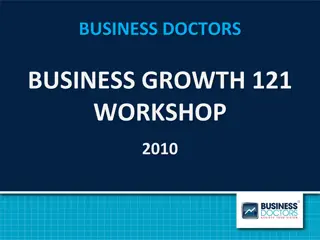Understanding the Importance of Business Planning
Explore the essential aspects of business planning, including defining objectives, utilizing tools and concepts, and communicating effectively. Learn how a business plan serves as a strategic guide and a communication tool for stakeholders, while understanding why entrepreneurs may choose unconventional approaches. Discover who benefits from business plans and the critical role they play in assessing feasibility, setting objectives, and clarifying ideas for both owners and managers.
Download Presentation

Please find below an Image/Link to download the presentation.
The content on the website is provided AS IS for your information and personal use only. It may not be sold, licensed, or shared on other websites without obtaining consent from the author. Download presentation by click this link. If you encounter any issues during the download, it is possible that the publisher has removed the file from their server.
E N D
Presentation Transcript
GTECH Business Plans
Learning Objectives Define and apply commonly used new venture business planning concept, skills and tools Demonstrate a comprehensive understanding of the principles and process of forming a strategic business plan
What is a Business Plan? A tool for analysis Creating the plan becomes a guide to gathering the relevant information that ensures the direction of the business is achievable and financially lucrative A tool for synthesis Converts vision into a strategy for the start-up, with respective action A tool for communication Communicates potential to stakeholders A call for action
The Business Plan: A tangible product of the ongoing planning process Articulates the vision of the start-up team Tells others that the entrepreneur is serious Often a requirement for funding from investors and financial institutions Tells others that the entrepreneur is serious Often a requirement for funding from investors and financial institutions Is a constant work in process: Businesses evolve and change their strategies/ markets/ offerings
The Nonconformist Entrepreneur becomes the Planner A traditional business plan includes: Executive summary Description of the business opportunity Marketing and promotional strategy Management strategy Operational strategy Financial forecasts Information on suppliers Entrepreneurs are often driven by: A unique idea Drive and determination An intuitive approach Gut feelings Heuristics- it gets the job done Bricolage- trying, testing, playing around Why might an entrepreneur think he/she does not need a business plan?
Who Cares about a Business Plan? Owners (often the entrepreneurs) A way to assess the feasibility of a business idea Set objectives: what is the direction of this business? Targets? Determine budgets and how much funding is needed Managers Clarify ideas- bringing it all together Establish what is known and what is not Determine staffing needs/Build or reorganize a team Practice analysis and presentation
Who Cares about a Business Plan? Investors: Is this a good investment? Capital Investors: Will I get a return? Financial Institution: Will this company be able to keep up with its payments? Interested in forecasts and how you got to them Great idea, but can they pull it off? What is the management structure? What will the money go towards?
Format of a Business Plan Who are we? Where are we going? How will we get there? Business idea, brand, and nature of the value added Targets and Forecasts Resource management Objectives The current market environment and how we fit in Marketing plan Goals The competition Financial forecasts How to measure progress The owners and management team Predicted changes to market environment Funding requirements Stokes and Wilson (2006)
Discussion Questions Does every start-up need a business plan? Start-ups that need external funding? Why/why not? Start-ups that are fully funded? Why/why not? Who should be involved in creating a business plan? How often should a business plan be changed/updated?
Case study: Gtech Company selling cordless electric products, primarily sweepers/vacuum cleaners, garden tools, and electric bikes Established 2001 Based in Worcestershire Sells products internationally and domestically Sells products online, in stores, and on television
Gtech In their own words (from the company website): Armed with a passion for design and a few savings to last him 18 months, Nick Grey resigned his position as Head of Product Development at a vacuum manufacturer. Working initially from his Worcestershire home, he developed the world s first cordless power sweeper. Since then, Gtech have gone from strength to strength. Today, we ve sold over 22 million products in 19 countries and have employees in the United Kingdom, United States of America and the People s Republic of China, making us experts in the field of cordless innovation.
Pre-video Discussion Based on Gtech s financial situation at start-up, do you what do you believe will be the owner s view on business plans and Do you think Gtech still uses business plans at present? What role do you think the business plan might play at their current state of operation?
Video Show video https://www.youtube.com/watch?v=D2NHEZ_PtXs
Case Study Discussion Questions Discuss the role of the business plan in Gtech Who appears in charge of the tangible aspects of the business plan? What is the owner s role in the composition of the business plan? Think of your enterprise/start-up idea. Make three columns: Who we are; where are we going; how will we get there. List things you know under each category, as well as things you would need to do further research to include in a business plan. Look at the business plan template just handed out to you. How did the items in your three columns match or not match what the bank is looking for?
References Stokes, D., Wilson, N. (2006). Small business management and entrepreneurship. Cengage Learning EMEA, Hampshire, UK.























